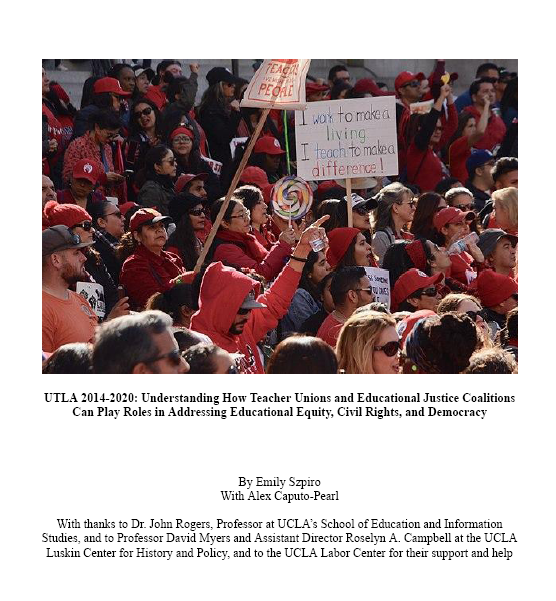UTLA 2014-2020: Understanding How Teaching Unions and Educational Justice Coalitions Can Play Roles in Addressing Educational Equity, Civil Rights, and Democracy
What happens in public education has a tremendous and unique influence on society, and school systems are some of the most important institutions for building the norms necessary for multi-racial democracy. Educators are strategically positioned to organize—with large unions, natural connections to the community, and jobs that require them to engage key issues in society.

To better understand how teacher unions can play a role in building power and fostering movements that address educational equity, civil rights, and the expansion of democracy in schools and surrounding communities, this report by 2024-25 LCHP Grantee Emily Szpiro takes the work of United Teachers Los Angeles (UTLA) in the 2014-2020 period as a case study. In 2014, out of decades of caucus and community work on the part of rank-and-file teacher leaders, progressives won leadership of UTLA. In this 2014 to 2020 period, the union leadership and broader organization helped to form a coalition with community organizations called Reclaim Our Schools LA; led on passing a membership-wide dues increase to increase the union’s organizing and community relations capacity; developed deep, democratic member structures; challenged privatization within public schools; won significant racial justice victories; helped build state-wide and national educational justice coalitions; and engaged a “Bargaining for the Common Good” approach that, through a strike in 2019, won class size reductions, more librarians and counselors, protection of healthcare, green space, limits on indiscriminate searches of students, a salary increase, Community Schools, an immigrant defense fund, and more.
This report explores, through over 100 interviews—with UTLA rank-and-file leaders, parents and youth key to building Reclaim Our Schools LA, UTLA elected leaders, long-time Community School and educational justice theoreticians and practitioners, elected teacher union leaders across the country, national community organizing luminaries, educational historians, and more—and archival research, how UTLA was able to move from a low-participation union that was alienated from the Los Angeles community to become a union that contributed to building a powerful community coalition and that was strong enough to lead the successful 2019 strike, and considers how this connection between teacher unions and social justice coalitions can work to shape educational policy.
Read the full report here.



